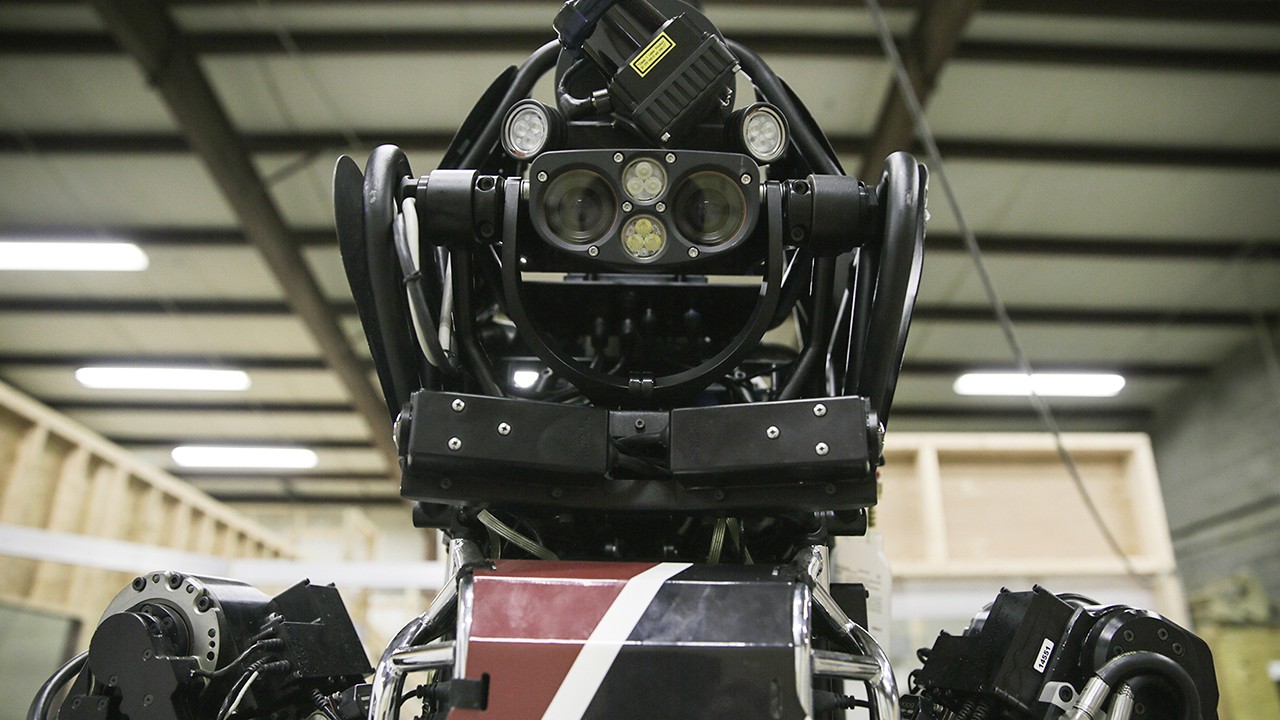Illustration by Xavier Lalanne-Tauzia
A few weeks ago, freshman congresswoman Alexandria Ocasio-Cortez sat down at a panel at South by Southwest and did what she does best, casually starting a conversation about one of the most pressing challenges facing the country.This time, she was talking robots.“We should not be haunted by the specter of being automated out of work. We should be excited by that,” she said, as reported by the Verge. “But the reason we’re not excited by it is because we live in a society where if you don’t have a job, you are left to die.”Ocasio-Cortez then proceeded to broach an ambitious (she mentioned a 90-percent rate) version of Bill Gates’s idea of a “robot tax,” or a levy on companies employing automated labor, and funneling the revenue toward the workers who lose wages and jobs. In exploring that terrain, she wasn’t alone among rising stars of the Democratic left.

In the last presidential election, automation took a backseat to racially-tinged debates around immigration, dwindling industries like coal, and outsourcing. Now, as Democrats try to flesh out policies that might tap into the populist energy exploited by Donald Trump in 2016, the future of automation is back in the conversation. It’s been a key talking point for 2020 candidates like Pete Buttigieg, Andrew Yang, Cory Booker, and even the tech-hesitant Bernie Sanders. The concept of a robot tax in particular has gained steam, not only to protect workers (the McKinsey Global Institute has estimated automation could quickly and easily eliminate upwards of $2.7 trillion in annual wages in the United States alone), but because of government revenue lost when companies have more machines than they do human labor.“What’s happened in the economic data is companies have become more productive, more profitable, but not more benevolent,” Buttigieg, the two-term mayor of South Bend, Indiana, said in an interview.Buttigieg, who has spoken about automation many times during his recent ascent to relevance in the 2020 primary, said he doesn’t believe companies should necessarily be penalized for embracing automation. But he also thinks that a system that holds companies accountable and shares profits with workers is in order, and he pointed to his own city—population roughly 100,000—as an example.South Bend, like many rust belt communities, has struggled for decades to weather the storm of deindustrialization, having relied heavily on traditional manufacturing and a handful of specific companies that are now dried out or obsolete. In his quest to revitalize the town, Buttigieg embraced some forms of automation, including a new waste collection system, but only after creating a plan for displaced workers through which they could be certified to become drivers in the area. “We’re mindful that this particular training might be automated away as well,” he said. “But this is about making sure someone who has the readiness to work can work.”There’s no one way a robot tax—or, for that matter, jobs displaced by automation—can be defined. But various experts and politicians have attempted to hypothesize what a progressive approach to the problem might look like. In their widely cited 2018 Harvard Law & Policy Review paper, researchers Ryan Abbott and Bret Bogenschneider proposed a plan based on the idea of tax neutrality: that companies should not be incentivized to automate for any other reason than to be more efficient. Which is to say they should not end up paying lower taxes by employing robots instead of humans, as they do now, skipping out on Social Security and Medicare taxes, and the like, when they use machines over people.Meanwhile, the duo argued, the increased revenue from taxing capital (like machinery) should be used to provide education and training for workers. “However you feel about automation, we are incentivizing it [currently] by choosing to tax labor over capital,” Abbott, one of the authors and a professor at the University of Surrey, told me. “Saying ‘tax robots’ is a little bit sexy, but probably doesn’t work so well functionally. Ultimately, what we’re talking about is how we can tax capital more than labor.”In both progressive and Silicon Valley circles, the conversation about workers displaced by automation usually comes back to universal basic income, or a centralized system of wages that isn’t contingent on the jobs themselves. Yang, the presidential hopeful and entrepreneur, has made this a pillar of his campaign, and Ocasio-Cortez is attempting to codify a version of it in the Green New Deal. And while the details of these admittedly ambitious proposals were likely to shift over time, experts suggested tax reform around automation could plausibly lead to a radical difference in how income is distributed.“I really welcome [Ocasio-Cortez’s] connection of technological optimism to the need for a social model around it,” said Mark Muro, a senior fellow at the Brookings Institution who has mapped the impacts of automation on communities across the country. “I think a lot of us are thinking that to deliver the disruption economy in a humane way, we need a much stronger social formula.”But even as the impacts of automation are already weighing on workers, the solutions remain stuck in the rhetorical mud. Two years ago, European lawmakers rejected a proposal to tax robot-related enterprises amid concerns it would stifle innovation. And when Gates first spoke publicly about a robot tax in 2017, former Treasury Secretary Lawrence Summers balked, calling Gates’s idea “protectionism against progress” and arguing that targeted wage subsidies and maybe even “direct” public-employment programs were the way to go.Buttigieg is taking a more near-term view. He wants a national debate that is focused less on blaming immigrants for lost jobs, and more on policies that promote wage increases and training for new gigs that actually exist. And in his city of South Bend, where structural economic wear and tear is nothing new, he said there should also be a focus on making sure people are able to form an identity that has more to do with their community than with their labor.“We need to begin softening the expectation that the workplace can supply your sense of identity,” he said. “You’re going to be more resilient if your sense of who you are is not only with your workplace.”Sign up for our newsletter to get the best of VICE delivered to your inbox daily.Follow Ankita Rao on Twitter.
Advertisement

In the last presidential election, automation took a backseat to racially-tinged debates around immigration, dwindling industries like coal, and outsourcing. Now, as Democrats try to flesh out policies that might tap into the populist energy exploited by Donald Trump in 2016, the future of automation is back in the conversation. It’s been a key talking point for 2020 candidates like Pete Buttigieg, Andrew Yang, Cory Booker, and even the tech-hesitant Bernie Sanders. The concept of a robot tax in particular has gained steam, not only to protect workers (the McKinsey Global Institute has estimated automation could quickly and easily eliminate upwards of $2.7 trillion in annual wages in the United States alone), but because of government revenue lost when companies have more machines than they do human labor.“What’s happened in the economic data is companies have become more productive, more profitable, but not more benevolent,” Buttigieg, the two-term mayor of South Bend, Indiana, said in an interview.Buttigieg, who has spoken about automation many times during his recent ascent to relevance in the 2020 primary, said he doesn’t believe companies should necessarily be penalized for embracing automation. But he also thinks that a system that holds companies accountable and shares profits with workers is in order, and he pointed to his own city—population roughly 100,000—as an example.
Advertisement
Advertisement
